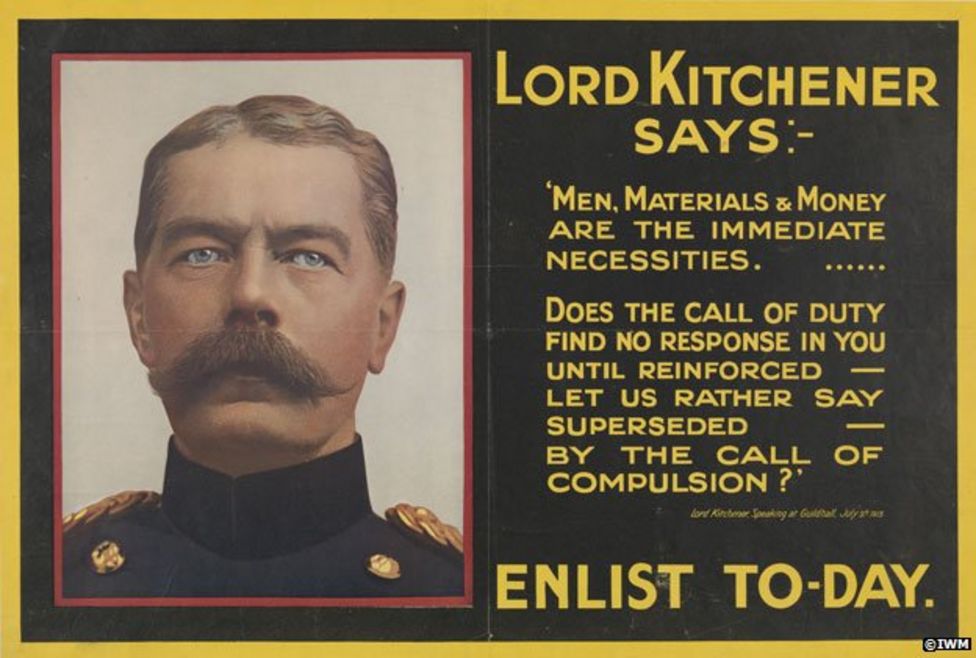Iconic Ads/Posters: Your Country Needs You

The iconic poster has Lord Kitchener pointing at the viewer & telling everyone that “your country needs you” is still recognisable
This is perhaps the most renowned pointing finger in history.
Over a hundred years after it was created, the image of the British war minister Lord Kitchener unsettlingly pointing at the viewer is still instantly recognisable. As satire and inspiration for military recruitment operations around the world, it’s still widely used in advertising. Illustrators have copied this thanks to the clever use of psychological trickery.
On August 4, 1914, the British government declared war on the Germans. Prime Minister Herbert Asquith of the United Kingdom named Kitchener as Secretary of State for War upon the onset of World War One. There had never been an army commander who became the secretary before Kitchener and he was tasked with building an army large enough to defeat Germany.
A single day, according to legend, was all it took for skilled illustrator Alfred Leete to create it. “Your Country Needs You” was printed on the front.
The poster has been credited with bringing in millions of men to serve in the military. During one of the busiest months for recruiting during World War I, the picture initially appeared on the cover of London’s renowned Opinion magazine on September 5, 1914. With the help of the magazine, which published postcard-sized copies, and the Parliamentary Recruiting Committee, the design was made available in poster form. On January 3, 1915, The Times newspaper in London captured this scene: “Posters appealing to recruits are to be seen on every hoarding, in most windows, in omnibuses, tramcars and commercial vans. The great base of Nelson’s Column is covered with them. Their number and variety are remarkable. Everywhere Lord Kitchener sternly points a monstrously big finger, exclaiming ‘I Want You.'”
The government also knew that a picture of Kitchener, who was beloved by the public and revered as a magnificent emblem of the British Empire’s military may help with recruitment.
A less dramatic depiction of the field marshal was initially employed on the official Parliamentary Recruitment Committee poster. It came next to a passage from one of his talks that was a little less inspiring: “Men, materials & money are the immediate necessities. Does the call of duty find no response in you until reinforced – let us rather say superseded – by the call of compulsion? Enlist today.”

The poster based on Leete’s design had a print run that was up to 15 times greater, so it had the resources and significance to stand out, but it is now virtually forgotten.
Every day, we are bombarded with photos of World War One, but one of them stands out above the rest. Leete’s striking design, with Lord Kitchener’s eyes following people from any angle, is undoubtedly a factor in its durability.
Leete’s depiction of Kitchener is carefully edited. To begin, his squint, which can be easily seen in the official poster’s lengthy description, has been fixed. His beard had grown thicker and darker, and he had broadened it as well. He was 64 years old when the war began and the design is likely based on an earlier photograph.
The directness of Kitchener’s hand motion is equally enticing. You become more interested and feel a need to answer when you point out a specific individual.
Also successful were the four phrases, “Your Country Needs You.” “They elicited feelings of remorse and patriotism in those who had not yet enlisted, but without going over the line into emotional coercion.
Lord Kitchener was apprehensive about the exploitation of his image in military recruitment operations. The words “God Save the King” were insisted upon by him because he believed they should be at the bottom of numerous posters, not because he should be urging people to join the military.
As many as 10,000 copies of this image may have been printed in the UK between 1914 and 1918, despite an estimated 5.7 million official posters being printed.



